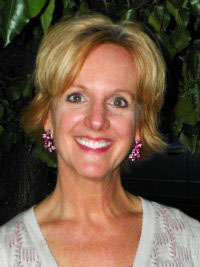Iowa State hosts autism awareness event

Alyson Beytien, a behavior specialist for the Mercy Autism Center in Dubuque, Iowa, will give a presentation from 7 to 8:30 p.m. on April 2, 2013, in Carver Hall Auditorium.
April 2, 2013
Approximately 100 people will attend an annual symposium on April 2, 2013 to hear an autism expert speak about the myths and tips about autism spectrum disorders.
The event will be hosted by Autism Spectrum Parent Information Resouce and Education, a parent-run support group for parents and teachers who have children with autism. It is open to the public and will take place from 7 to 8:30 p.m. in the Carver Hall Auditorium.
“[Autism is] so prevalent; it’s really almost an epidemic. We really need to figure out … how to help those who have it lead a life that’s happy and successful,” said Alyson Beytien, the key speaker of the event.
Beytien has three sons with autism and is the behavior specialist for the Mercy Autism Center in Dubuque. She speaks across the United States and Canada about issues related to autism spectrum disorders. Her presentation will center on five tips which families and educators can use on a daily basis to help children with autism be as successful as possible.
Autism Spectrum Parent Information Research and Education hosts annual symposiums that are open to the public, but they also have monthly meetings throughout the year.
Beytien and Jamie Gurganus — who also has a child with autism and works for Heartland Area Education Agency, which is sponsoring the event — agree that these events are very helpful for families.
Gurganus said the meetings support families by allowing them to be “able to walk in my shoes” and relate to each other.
According to Beytien, recent research shows that one in 88 children currently has some degree of an autism spectrum disorder.
“So much of what happens to us is similar, yet we often feel that we’re the only parents that have had it happen,” Beytien said.
Even those who do not parent or teach a child with autism should attend the event because it will change “the way people view and interact with the individuals on the spectrum,” Beytien said.
“Whether it’s your own child or your neighbor’s child or the child that you’re going to hire or the child you’re going to teach, [there are] so many abilities— not disabilities, but abilities — that these children have,” Beytien said.
Gurganus and Beytien believe that there are still many misunderstandings about autism.
Beytien said individuals with autism are not intellectually impaired and that there is a misunderstanding about the intelligence level of those individuals.
“Because their communication skills are impaired, and their social interactions are impaired, they’re often dismissed,” Beytien said.
Gurganus said there are also negative behavioral stereotypes.
“[Understanding autism] helps the public understand and maybe have a little empathy for a child who is having a tantrum in the middle of the store … and understand some of the quirky behaviors these kids have,” Gurganus said.
Gurganus stresses that bad parenting and a lack of discipline does not influence the behavior of a child with autism. Many times, the public does not realize that certain individuals have a form of autism, which can lead to negative feelings toward those people.
“If someone is in a wheelchair, they understand. They know,” Gurganus said.
Beytien also said there is a myth that children with autism are “off in their own little world” and do not connect or make close relationships with others.
“Many of them have an innate sense of who to trust, who’s supportive of them [and] who enjoys them versus those who are scared or frightened of them,” Beytien said.
Beytien’s speech will focus on daily care that can be given to help children with autism become successful. She believes that this will help dispel the myths about autism.
“It’s one thing to hear a diagnosis and to hear it on the news. It’s another to hear what really happens in families. [The public] should hear the good, the bad and the ugly of disabilities,” Beytien said.
















